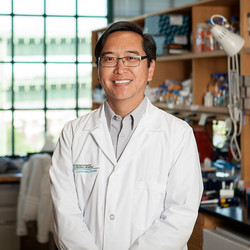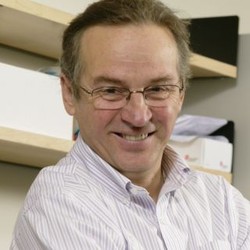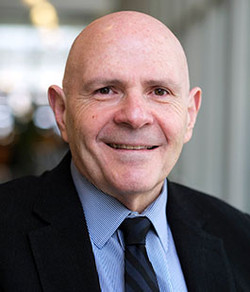Events
Jul 15 - 29, 2021
HKU Distinguished Visiting Scholar Seminar Series
School of Biomedical Sciences cordially invites you to join the following HKU Distinguished Visiting Scholar Seminar Series:
Date: Thursday, July 15, 22 & 29, 2021
Format: Conduct via ZOOM
ZOOM Link: https://bit.ly/3A9etQw
Meeting ID: 936 7833 4199
Passcode: 052650
| Date | Title of Talk | Speaker |
|---|---|---|
| Thursday, July 15, 2021 9:00 am |
Mechanisms Suppressing Genomic Instabilities and Their Implications in Cancer Therapy | Professor Lee Zou Scientific Co-Director, Massachusetts General Hospital Cancer Center, Professor of Pathology, Harvard Medical School, James & Patricia Poitras Endowed Chair for Cancer Research |
| Thursday, July 22, 2021 4:00 pm |
Engineering a Safe and Allo-Tolerated Pluripotent Stem Cell Line: A Global Source for Off-the-Shelf Therapeutic Cell Products | Professor Andras Nagy Professor in the Department of Obstetrics & Gynaecology and Institute of Medical Science, University of Toronto, Canada Professor in Australian Regenerative Medicine Institute (ARMI), Monash University, Australia |
| Thursday, July 29, 2021 9:00 am |
Dynamic Biomaterials for Cell Signaling | Professor Samuel I. Stupp
Professor in Departments of Chemistry, Materials Science & Engineering, Medicine, and Biomedical Engineering, Center for Bio-Inspired Energy Science and Simpson Querrey Institute at Northwestern University |

Professor Lee Zou
Scientific Co-Director, Massachusetts General Hospital Cancer Center, Professor of Pathology, Harvard Medical School, James & Patricia Poitras Endowed Chair for Cancer Research
Title: Mechanisms Suppressing Genomic Instabilities and Their Implications in Cancer Therapy
Abstract: Genomic instability is a hallmark of cancer and also a vulnerability of cancer cells that can be targeted in cancer therapy. My lab is interested in understanding how genomic instability arises during tumorigenesis and how cancer cope with their intrinsic genomic instability to survive and evolve. By elucidating the molecular mechanisms that suppress genomic instability in cancer cells, we hope to identify and target pathways that are specifically indispensable in cancer cells, killing cancer cells by synthetic lethality. In this lecture, I will discuss our recent studies on several novel mechanisms that suppress genomic instability in different oncogenic contexts, which may shed light on new strategies for cancer therapy.
Biography: Lee Zou received his Ph.D. training at the Cold Spring Harbor Laboratory, and his postdoctoral training at Baylor College of Medicine and Harvard Medical School. He is currently Professor of Pathology at Harvard Medical School, Scientific Co-Director of the Massachusetts General Hospital Cancer Center, and the James and Patricia Poitras Endowed Chair in Cancer Research. His research has focused on understanding how genomic stability is maintained in human cells and how genomic instability arises in cancers. In particular, his lab has extensively studied the mechanisms by which DNA damage is sensed and signaled in human cells. Work by Zou and colleagues has elucidated how the ATR checkpoint pathway is activated by DNA damage and DNA replication stress, establishing the framework of the current models of DNA damage signaling. In addition, studies from the Zou lab has shed new light on the causes of genomic instability in cancer cells and the resulting vulnerabilities, providing new opportunities for targeted cancer therapy.

Professor Andras Nagy
Professor in the Department of Obstetrics & Gynaecology and Institute of Medical Science, University of Toronto, Canada
Professor in Australian Regenerative Medicine Institute (ARMI), Monash University, Australia
Title: Engineering a Safe and Allo-Tolerated Pluripotent Stem Cell Line: A Global Source for Off-the-Shelf Therapeutic Cell Products
Abstract: The use of ex-vivo cultured cells as therapeutic means is currently on its way into the clinic to treat devastating degenerative conditions. We addressed one of the most urgent roadblocks for such cell therapies, the allograft tolerance without the need for immune suppression. Here we present that the transgenic expression of eight local-acting, immune-modulatory transgenes is sufficient to protect cells against rejection and achieve induced Allogeneic Cell Tolerance (iACT) in fully immune-competent mice. Allografts survived long-term, in different MHC-mismatched recipients, and without the use of immunosuppressive drugs. The immune-modulatory genes have highly conserved functions, suggesting that the strategy would also work in the human system. iACT stem cells could serve as a source for off-the-shelf available cells to treat/cure medical conditions without the need for immune suppression of the patient.
However, it is critical to provide a steadfast level of safety in cell-based therapies involving the evasion of immune rejection. The lack of immune surveillance on these cells raises the likelihood of them developing cancer. To make the cells clinically relevant, we developed a solution for cell safety by building a highly reliable kill-switch into the cells, allowing the elimination of cells with cancerous potential or uncontrolled proliferation. This “SafeCell” system also allows the quantification of risk in the function of cell number needed for each specific therapeutical goal, which is critical to make informed decisions by the regulators, doctors, and patients to advance the modern medicine-transforming cell therapies.
The combination of the SafeCell and iACT genome editing allows the generation of a “single” pluripotent cell line as a source of off-the-shelf available therapeutic cell products for all humankind.
Biography: Professor Nagy is a senior scientist at the Lunenfeld-Tanenbaum Research Institute, Mount Sinai Hospital, Toronto, Ontario, Canada and Professor in the Department of Obstetrics & Gynaecology and Institute of Medical Science at the University of Toronto. He also hold a Professor position at the Monash University, Melbourne, Australia and a second laboratory in the Australian Regenerative Medicine Institute (ARMI). His laboratories focus on several areas of interest, which include 1) functional studies of genes belonging to families with known roles in blood vessel formation; 2) development of sophisticated genetic manipulation tools in human in vitro and mouse in vitro and in vivo models; 3) derivation, differentiation and genetic modification of both mouse and human Embryonic Stem cells; 4) reprogramming of somatic cells to pluripotent stem cells using a novel methods; 5) understanding the key molecular players in the reprograming process and 6) addressing critical challenges of cell therapies, such as safety and allograft tolerance.

Professor Samuel I. Stupp
Professor in Departments of Chemistry, Materials Science & Engineering, Medicine, and Biomedical Engineering, Center for Bio-Inspired Energy Science and Simpson Querrey Institute at Northwestern University
Title: Dynamic Biomaterials for Cell Signaling
Abstract: Our laboratory is focused on the design of synthetic nanomaterials that can trigger signaling pathways relevant in biological regeneration. These systems are supramolecular polymers that form fibrils which mimic structural components of mammalian extracellular matrices. One interesting feature of supramolecular biomaterials is their dynamic nature which can be used to create superstructures and optimize their capacity to signal cells. This lecture will describe recent progress from the Stupp Laboratory at Northwestern University in this area of nanomedicine, focusing on neural and musculoskeletal regeneration.
Biography: Samuel Stupp is the Board of Trustees Professor of Materials Science and Engineering, Chemistry, Medicine, and Biomedical Engineering at Northwestern University. He also directs at Northwestern the Simpson Querrey Institute for BioNanotechnology and the Center for Bio-Inspired Energy Science, an Energy Frontier Research Center sponsored by the U.S. Department of Energy. His laboratory integrates chemistry with materials science, biology, and medicine. The overarching interest of Stupp’s research group is the development of self-assembling organic materials, focusing on functions relevant to energy and medicine. In the area of energy science, the laboratory’s interests include materials for solar photovoltaics, catalytic materials that can synthesize solar fuels, supramolecular ferroelectrics for non-volatile memories, and artificial muscle materials for inter-conversion of chemical and mechanical energy. In the area of medicine, the Stupp laboratory is interested in biomaterials for regenerative medicine of the brain, spinal cord, bone, cartilage, and muscle, and also on targeted systemic drug delivery using nanostructures for cancer and cardiovascular applications. The organic structures of interest in both areas include visible light-absorbing chromophores, organometallic catalysts, electron donors and acceptors, DNA, peptides, glycopeptides, and polymers, among others.
ALL ARE WELCOME
Should you have any enquiries, please feel free to contact Miss River Wong at 3917 9216.

